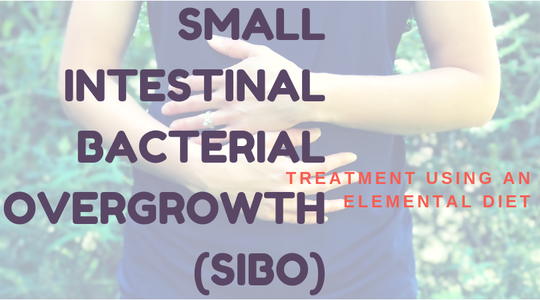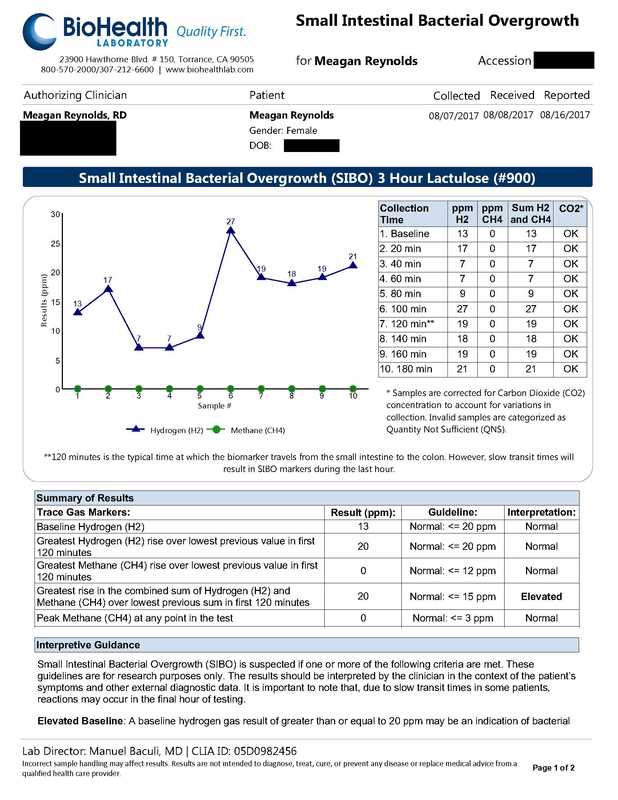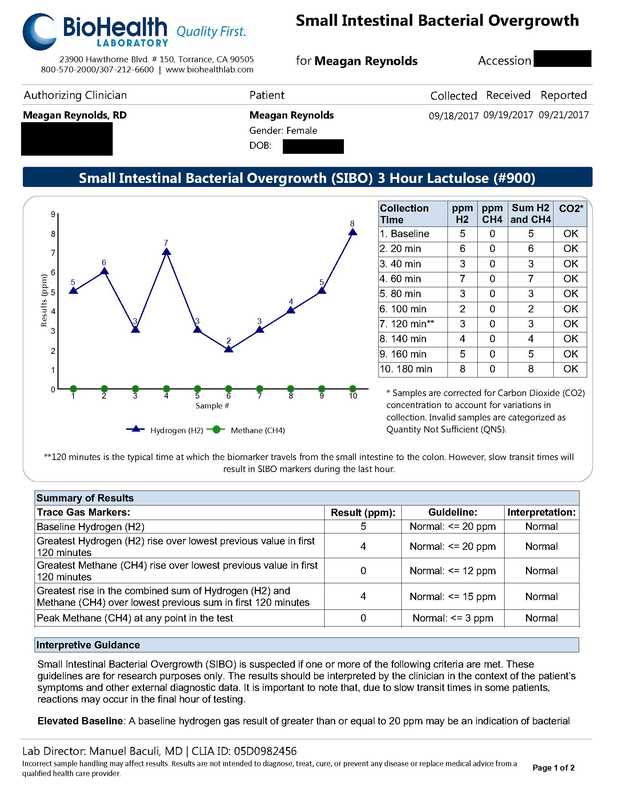|
Small intestinal bacterial overgrowth, better known as SIBO, is just as the name implies; it’s an overgrowth of bacteria in the small intestine. Many classic symptoms of irritable bowel syndrome such as gas, bloating, abdominal discomfort, diarrhea, and constipation are identical to that of SIBO, and it has been suggested as a possible cause in IBS. (1) As the bacteria eat the food we eat and ferment the high carbohydrate component of the meal, this fermentation is what causes the symptoms. SIBO causes inflammation within the small intestines that may interfere with the absorption of nutrients leading to the symptoms associated with SIBO as well as nutrient deficiencies specifically of the fat-soluble vitamins A, D, and E. (2) SIBO can often float under the radar and be challenging to identify as it does not always present itself in a clear picture. The symptoms caused by SIBO can be very mild, or they can be severe and cause great distress for the individual. My Story Personally, there have been many layers that I have had to peel back and examine in my health journey due to having Hashimoto's, and SIBO was one of them. My symptoms were frequent and sometimes severe bloating, mood swings, extreme fatigue, weight loss, anxiety, and just a general feeling of being run over by a semi-truck. I ran a complete stool analysis at the time, which came back normal. My symptoms started shortly after having my son coupled with a huge career move for both my husband and I. I just correlated it to significant hormonal shifts, adjustment to motherhood, and financial stress of starting new businesses. Being a new mom is naturally exhausting, and I know it was truly the spark that set off my Hashimoto's. Two things that are known to affect gut motility are stress and autoimmune disease, and the most common reason SIBO develops is from a motility issue. The function in the gut that sweeps residual debris through the GI tract, known as the migrating motor complex (MMC), often does not work efficiently in motility disorders, and bacteria may not be moved from the proximal bowel to the colon. I had both of those going against me, but I kept making myself believe that all my symptoms were normal and would resolve once everything calmed down. The results on the top are my first lactulose breath test (LBT) that confirm SIBO, and the results on the bottom are the repeat LBT after completing a 3-week elemental diet protocol. As you can see, the repeat is normal. My results were not as high as some others that I have seen, but my symptoms in conjunction with my results were enough confirmation for me. Diagnosis of SIBO SIBO is commonly diagnosed using a breath test with a lactulose or glucose substrate. It is noninvasive and low cost, which makes it the preferred route for testing. The individual will drink either substrate, then blow into a bag that has a vial attached to capture various breath samples over a defined period. Lactulose is a nonabsorbable disaccharide that is metabolized to short-chain fatty acids in the colon and glucose is a monosaccharide that is completely absorbed in the proximal small intestine. In the presence of SIBO, fermentation of either one produce gases that can be measured in a breath test. Another way of diagnosing SIBO involves obtaining a culture of an aspirate from the jejunum. This method is invasive, costly, and it is not able to reach the distal small bowel, which is why it is not favored in clinical practice. (3) Etiology of SIBO It is best to understand why SIBO developed in the first place to be able to eradicate it and prevent a reoccurrence. If SIBO was eradicated, but it came back, then it’s possible that the cause was never addressed. There are many risk factors and causes for SIBO, and this is by no means an exhaustive list, but the following are some of the most well-known:
Treatment Eradicating SIBO can be challenging due to the underlying issues that caused it and how resistance the bacteria can be to treatment. Some cases clear after one protocol while others require a variety of them over months to years. There is no universally accepted gold standard to treatment, but it is recommended to switch it up if the previous therapy did not work. It's also important to note that there may be other viruses, bacteria, toxins, or pathogens present that are keeping you from clearing SIBO, so patience is key to being successful with whatever route you and your practitioner choose. The antimicrobials used to restore microbial balance are either antibiotics or herbal antimicrobials. Research has shown that herbal antibiotics are at least as effective as Rifaximin (common antibiotic for SIBO) for resolution of SIBO by lactulose breath test. The other treatment option that has been shown to be highly effective at normalizing microbial balance is with an elemental diet. (10) If I have a client that presents with SIBO and they have not tried anything else before seeing me, I typically will try the herbal route first because it allows me not just to address SIBO, but also Candida and other pathogens that commonly accompany it. Elemental Diet If someone has a severe case of SIBO or they have tried other modalities, then I will typically recommend an elemental diet. An elemental diet is the most difficult to do, and it is not for everyone, but it is another great option especially for someone who has severe gut issues or if antimicrobials were unsuccessful. An elemental diet is a medical food diet where the carbohydrates, proteins, and fats are in a readily assimilated form that's easily absorbed into the proximal small bowel, which requires little to no digestive effort. An elemental diet frees up the nutrients so that they can be fully absorbed, it allows the gut to rest and heal, and it doesn’t allow for any fermentation to occur in the small intestines, which cuts off the food source for the overgrowth of bacteria in the small intestines. Typically, an elemental diet is used short-term in individuals with moderate to severe gastrointestinal dysfunction for 14-21 days. Specifically for SIBO, it's used for 2-3 weeks max. Because this will be your sole source of nutrition during this period, you need to know your caloric needs to know how much to drink throughout the day. This will be calculated by your practitioner and adjusted as needed throughout your protocol. If you choose to do it on your own, then a general rule of thumb is 25-30 calories per kilogram of body weight, though each individual's needs will ultimately vary. I was ecstatic to have eradicated SIBO using only an elemental diet. However, my bloating improved, but my energy and some of my other symptoms did not, which was a sign that there was still a lot of work left to do with my health. This is often the case with a lot of people dealing with SIBO because you still need to address the other health issues that allowed the bacteria to overgrow in the first place. Recommended Product for Elemental Diet If you’re interested in making your elemental drink, here is a recipe that is available on siboinfo.com. I have never tasted it, but I have heard it's not the most pleasant. The only company that makes an elemental diet that I currently recommend is Physicians' Elemental Diet by Integrative Therapeutics, which is what I used for my SIBO. There are other brands available, but due to the their ingredients, I don't recommend them. Integrative Therapeutics recently came out with a revised dextrose-free version that is great for those dealing with Candida, fungal overgrowth or who have a glucose sensitivity. The product is called Physicians’ Elemental Diet Dextrose-Free, and it contains 10 grams less sugar per serving than the original Physicians’ Elemental Diet as it substitutes maltodextrin in place of dextrose. I prefer this form since it's not as sweet, is lower in carbohydrates, and you don't risk worsening any underlying fungal issues that you may not even be aware of. Is an Elemental Diet Right For You? As a dietitian in functional nutrition in my own healing journey, I have used myself as a guinea pig to test out the protocols, diets, and detoxes that I use in practice. There are a couple of reasons I chose the elemental diet. For one, I wanted to try the elemental diet so that I could know firsthand what my clients may have to go through from everything to the physical aspect of not eating to the emotional aspect that comes with the diet. The second reason was that I wanted an easy route. This included a break from cooking, preparing, and thinking about food. It’s important to assess where you’re currently at so that you can choose what’s best for you. A minimum of two weeks on an elemental diet is recommended, followed by retesting, and if positive, another week on the diet is typically suggested before retesting. I ended up doing it for three weeks before testing so that I did not have to potentially retest, but I wouldn't recommend that for everyone. Throughout this diet, you will only be drinking water, some herbal teas, the elemental drink, and that’s about it. Symptoms that may be experienced include emotional, flu-like, nausea, rash, fatigue, or headaches. I had many symptoms surface while on the elemental diet. I was way more emotional and sensitive than I ever was and this was the hardest part for me. I think it’s important to note that I was also taking care of my one-year-old son who was teething and not sleeping well all while my husband was out of town for part of it. I kept a journal while on the elemental diet so that I could keep track of my progress. My energy was not the greatest, but that could have been due to the lack of sleep from my son. Surprisingly, I was not hungry throughout the entire three-week period. I also lost a total of five pounds during it, and my bloating was completely gone, which isn’t surprising since my stomach was on vacation. If you’re not able to take sick time from work in case the need for it arises, then an elemental diet may not be the best choice. There can be a few tough days where you may want a little flexibility in your schedule. I also don’t recommend this diet for people who have severe adrenal or blood sugar issues and who are malnourished or have an eating disorder. Tips on an Elemental Diet
Post Treatment Once SIBO is eradicated, it is important to follow a modified diet for several months that is low in FODMAPS to prevent a reoccurrence. It is also recommended to take a motility agent that will help to keep things moving along in the GI tract for several months as well. Working with a practitioner who has experience with SIBO is important as treatment should be individualized according to the client’s history and test results. For some people, getting a diagnosis of SIBO and successfully eradicating it is a game changer in their health, but for others, it just means that more work needs to be done. Further Info. If you're interested in learning more about the elemental diet and SIBO, I recommend listening to the podcast with Dr. Lela Altman. Sources
Comments are closed.
|
Hello!I'm Meagan Reynolds- a certified functional medicine practitioner and dietitian located in Nashville, TN. After overcoming my own health challenges with hypothyroidism, I was motivated to create my own practice where I help women reverse their thyroid, gut, and hormonal issues so they can reclaim their health. Archives
July 2023
Categories
All
|





 RSS Feed
RSS Feed